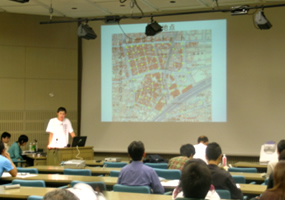Education
Graduate program
At the Department of Geography, students conduct comprehensive studies on the mutual interactions between the natural environment and human activity, which are the key constituent elements of an urban area. We train leading researchers and professional engineers through cutting-edge research in the various fields of geography, including geomorphology and geology, climatology, environmental geography, GIS, and human geography.
The graduate degree programs in the Department of Geography are strongly research oriented, and the completion of a thesis is the main focus at both the Masters and Ph.D. levels. The Department has excellent research, analytical and computing laboratories. Our large and active group of graduate students and faculty conduct research in locations all over the world.


For more information
Web Page of Graduate School of Urban Environmental Sciences, Tokyo Metropolitan University
Courses and credit requirements
- Credit requirements
- Courses on the master’s program
- Important information about master’s courses
- For the four Seminar in Geographic Environmental Sciences courses (Seminar in Geographic Environmental Sciences I-IV), students need to acquire a total of eight credits (two credits for each course). Courses I and II are taken in the first and second semester of the first year respectively, and courses III and IV are taken in the first and second semester of the second year respectively. Students who are unable to acquire the credits for Seminar in Geographic Environmental Sciences I and II in the first year of the program must repeat the year.
- For the Special Seminars in Geographic Environmental Sciences, parts I and II should be completed in the first and second semester of the first year respectively, and parts III and IV should be completed in the first and second semester of the second year respectively. These credits are received for attending defenses of doctoral theses (no fixed schedule), the intermediate seminars for doctoral thesis (late July and late January), the final seminar for master’s thesis (late January), the intermediate seminar for master’s thesis (early October), the preliminary seminar for master’s thesis (late November-early December), the final seminar for graduate thesis (late January-early February), the intermediate seminar for graduate thesis (early October), and the Department colloquiums (no fixed schedule). Students must also give their own presentations at the preliminary seminar for master’s thesis in the first year, and at the intermediate seminar for master’s thesis and the final seminar for master’s thesis in the second year.
- For Research for and Preparation of Master’s Thesis I, which students must complete in the first year, students acquire the necessary credits by either (1) taking part in a field exercise, or (2) assisting with fieldwork and/or analysis for master’s and doctoral theses (students must participate in either (1) or (2) at least once). Research for and Preparation of Master’s Thesis II is the research and laboratory work for the preparation of the student’s own master’s thesis and is carried out in the second year. Even for the students who enter the university in October, the class registrations of Research for and Preparation of Master’s Thesis I and II are respectively limited in April. After participation, students taking Research for and Preparation of Master’s Thesis I must get the signature of their supervisor on an Application for Credit Recognition and promptly submit it to the vice-head of the educational board in the Department. The form is available at the Department Office (Room 8-877) or downloaded from the Department official website (“from the campus ONLY” page).
- We recommend acquiring at least eight credits in the Advanced Studies courses (such as Advanced Studies of Geomorphology I/II, etc.).
- As stipulated in Article 30 (Paragraph 2) of the Tokyo Metropolitan University Graduate School Regulations, up to 10 credits of the 30 credits needed to complete the program can be fulfilled with credits received by taking courses offered by another department of the graduate school, another graduate school, or an undergraduate faculty. If the “common courses” (courses offered across all departments of the Graduate School of Urban Environmental Sciences) are included, it is possible to include up to 14 credits from courses offered by another department of the graduate school in the credits required for completion. If you wish to fulfill credit requirements by taking courses offered by other departments, other graduate schools, or undergraduate faculties, you must receive the permission of your supervisor. You must request your supervisor to stamp your List of Chosen Courses and ensure that you submit your registration to the office counter of the academic affairs section of the Graduate School of Urban Environmental Sciences during the specified period at the start of the semester. In addition to the above, the head or vice-head of the educational board at the Department may instruct certain students to take particular undergraduate lectures, practical training sessions, or seminars that are necessary for their academic progress (only in the first year of the program). Contact the educational board at the Department for more information.
- Students who wish to be considered for allowance to complete the program at an accelerated pace (the system of “skipping a year” [tobikyū]) should notify their supervisor and the vice-head of the educational board at the Department.
- Table 1 shows a model for taking courses in the master's program. A minimum of 30 credits are required for completion of the program.
- Courses on the doctoral program
- Important information about doctoral courses
- Students should take Seminars in Geographic Environmental Sciences V and VI (first and second semesters of the first year), VII and VIII (first and second semesters of the second year), and IX and X (first and second semesters of the third year) in the first and second semester respectively.
- In order to acquire the necessary credits for Special Seminars in Geographic Environmental Sciences I and II (first and second semesters of the first year), III and IV (first and second semesters of the second year), and V and VI (first and second semesters of the third year), students must attend the defenses of doctoral theses (no fixed schedule), the intermediate seminars for doctoral thesis (late July and late January), the final seminar for master’s thesis (late January), the intermediate seminar for master’s thesis (early October), the preliminary seminar for master’s thesis (late November-early December), and the Department colloquiums (no fixed schedule).
- For Research for and Preparation of Doctoral Dissertation III, which students must complete in the first year, students receive credits for either (1) taking part in a field exercise, or (2) assisting with fieldwork and/or analysis for master’s and doctoral theses (students must participate in either (1) or (2) at least once). After participation, students must get the signature of their supervisor on an Application for Credit Recognition and promptly submit it to the vice-head of the educational board in the Department (assigned to the Graduate School). The form is available at the Department Office (Room 8-877) or downloaded from the Department official website (“from the campus ONLY” page). Even for the students who enter the university in October, the class registration of Research for and Preparation of Master’s Thesis III is limited in April.
- Credits received for Special Lectures (such as Special Lecture on Geomorphology I/II, etc.) can be used as credits for the doctoral program.
- You can include up to nine credits from “common subjects” (subjects offered across all departments of the Graduate School of Urban Environmental Sciences) in the credits required for completion.
- Students who wish to be considered for allowance to complete the program at an accelerated pace (the system of “skipping a year” [tobikyū]) should notify their supervisor and the vicehead of the educational board at the Department.
- A model for taking courses in the doctoral program is given below. A minimum of 20 credits are required for completion of the program, but as can be seen in the model for taking courses shown in Table 2, there are required credits, so it is actually necessary to earn more than 20 credits.
Both the master’s program (Figure 1) and the doctoral program (Figure 2) require students to acquire a prescribed amount of credits by attending seminars, lectures, and laboratory work. After acquiring the required credits, students submit a thesis, and must be awarded a pass for both the thesis and the final examination in order to officially complete the program and be awarded a degree. For the master’s program, the final seminar for master’s thesis, which also serves as the final examination, is held in late January (or late July). For the doctoral program, an appointment for the defense of the doctoral thesis, which also serves as the final examination, is arranged for each student as needed.
Before going on fieldwork for your master’s or doctoral thesis, you must receive the approval of your supervisor. Once you have their permission, submit a Fieldwork Travel Notification to the vice-head of the educational board at the Department of Geography. The form is available at the Department Office of the Department of Geography on Room 877 of Building No. 8 or downloaded from the Department official website (“from the campus ONLY” page).
The master’s program consists of the following courses: Seminar in Geographic Environmental Sciences I/II/III/IV (Geomorphology and Quaternary Geology, Climatology, Environmental Geography, Geographical Information Sciences, and Urban and Human Geography), Special Seminars in Geographic Environmental Sciences I/II/III/IV, Research for and Preparation of Master’s Thesis I/II, Advanced Studies of Geomorphology I/II, Advanced Studies of Climatology I/II, Advanced Studies of Environmental Geography I/II, Advanced Studies of Geographic Information Sciences I/II, Advanced Studies of Human Geography I/II/III/IV, Spatial Information Science I/II, Advanced Studies of Geographical Sciences I–VI, Special Exercise in Geographic Information Systems, and the Internship. Research for and Preparation of Master’s Thesis I is 6 credits, Advanced Studies of Geographic Environmental Science VI is 1 credit, and other courses are 2 credits.
| 1st year, 1st semester | 1st year, 2nd semester | 2nd year, 1st semester | 2nd year, 2nd semester | |
|---|---|---|---|---|
| Seminar in Geographic Environmental Sciences (8 credits required) | I (2 credits) | II (2 credits) | III (2 credits) | IV (2 credits) |
| Special Seminar in Geographic Environmental Sciences(8 credits required) | I (2 credits) | II (2 credits) | III (2 credits) | IV (2 credits) |
| Research for and Preparation of Master's Thesis(8 credits required) | I (6 credits) | II (2 credits) | ||
| Advanced Studies | It is advisable to earn a total of at least 8 credits from Advanced Studies I and II. | |||
The doctoral courses include: Seminars in Geographic Environmental Sciences V/VI/VII/VIII/IX/X (Geomorphology and Quaternary Geology, Climatology, Environmental Geography, Geographical Information Sciences, and Urban and Human Geography), Special Seminars in Geographic Environmental Sciences V/VI/VII/VIII/IX/X, Special Lecture in Geomorphology I/II, Special Lecture in Climatology I/II, Special Lecture in Environmental Geography I/II, Special Lecture in Geographic Information Sciences I/II, Special Lecture in Human Geography I/II/III/IV, and Research for and Preparation of Doctoral Dissertation III. Special Lecture on Geographic Environmental Sciences VI is 1 credit, Research for and Preparation of Doctoral Dissertation III is 6 credits, and other courses are 2 credits.
| 1st year, 1st semester | 1st year, 2nd semester | 2nd year, 1st semester | 2nd year, 2nd semester | 3rd year, 1st semester | 3rd year, 2nd semester | |
|---|---|---|---|---|---|---|
| Seminar in Geographic Environmental Sciences(12 credits required) | V (2 credits) | VI (2 credits) | VII (2 credits) | VIII (2 credits) | IX (2 credits) | X (2 credits) |
| Special Seminar in Geographic Environmental Sciences(12 credits required) | V (2 credits) | VI (2 credits) | VII (2 credits) | VIII (2 credits) | IX (2 credits) | X (2 credits) |
| Research for and Preparation of Doctoral Dissertation(6 credits required) | III (6 credits) | |||||

Figure 1: Standard course of study (master’s program)

Figure 2: Standard course of study (doctoral program)
